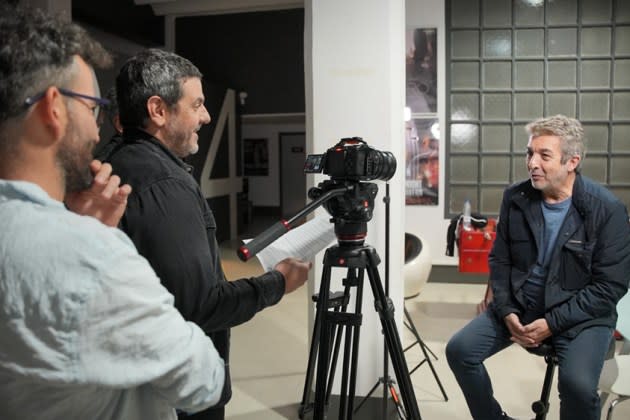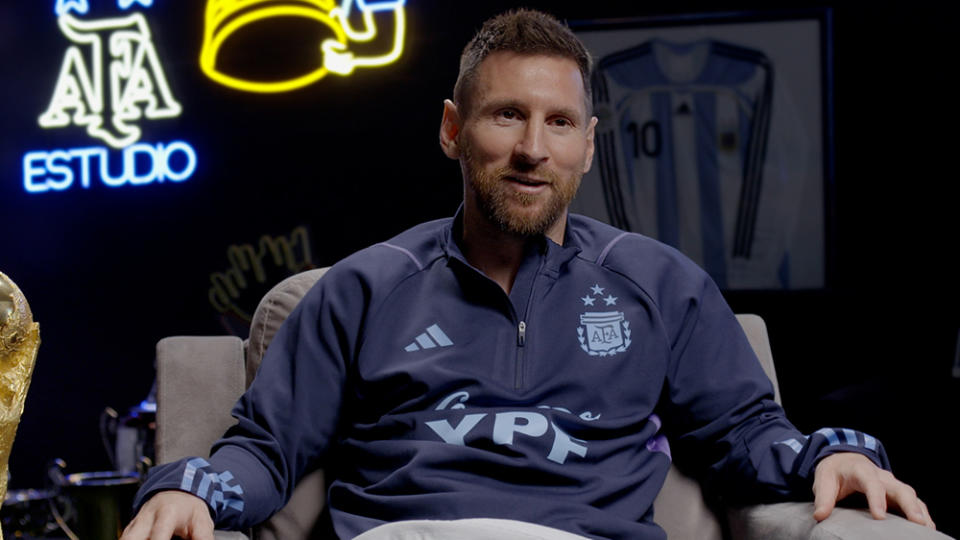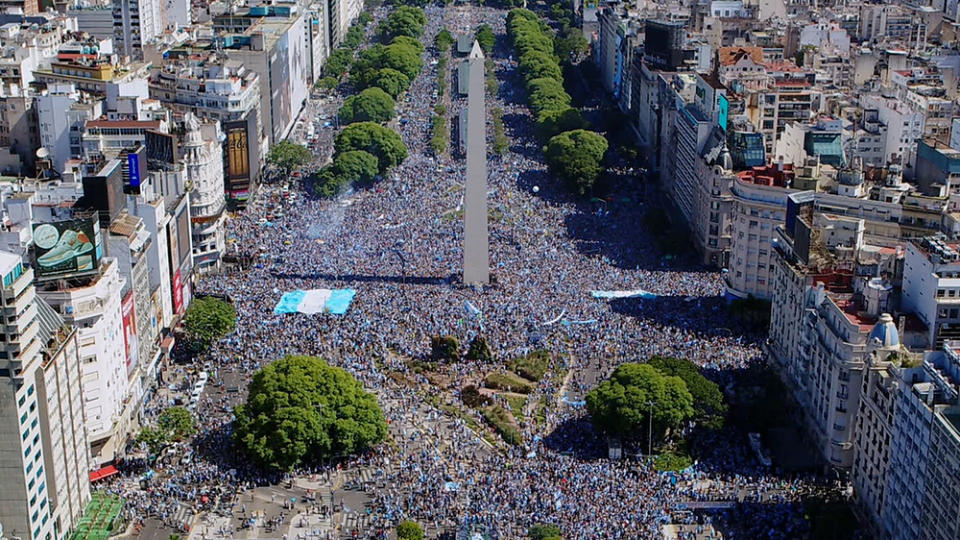HBO Max’s ‘Soccer Soul’ Doc, About How Lionel Messi and Argentina Won the World Cup, Unpacked by ‘Secret in Their Eyes’ Star Ricardo Darín
- Oops!Something went wrong.Please try again later.
- Oops!Something went wrong.Please try again later.
- Oops!Something went wrong.Please try again later.

MADRID — Greater than fiction. Viewed by an estimated 5 billion, the most watched event in TV history, and the climax of the most popular sport on earth, no achievement compares in epic terms to Argentina’s victory in the 2022 FIFA World Cup.
Yet soccer, as Atletico de Madrid manager Diego Simeone famously has it, is played match by match. It is won moment by moment. No doc feature to date perhaps captures the ever evolving drama of Argentina’s campaign – the flux and flow of psychological advantage, the huge emotional stakes, the roll call of protagonists, and the multiple narratives of universal resonance emerging moment by moment – than “Soccer Soul” (“Elijo Creer”), narrated by Ricardo Darín, star of Oscar-winning “The Secret in Their Eyes” and dropped by HBO Max on Jan. 11 in Argentina and the rest of Latin America.
More from Variety
It begins with the defining moment of the whole 2022 FIFA World Cup. Insistently, Darín’s voiceover, points up the immediate drama. Visuals capture from above Argentine right back Gonzalo Montiel walking slowly to the penalty spot to take the eighth kick of the penalty shoot-out climaxing the final between Argentina and France.
“There are moments that leave an imprint on the memories of an era,” Darín intones. “These golden moments are made by men, sportsmen, who must make decisions which will shape their lives. The hell of defeat and the glory of triumph. Gonzalo Montiel reaches that crossroads,” he adds.
If Montiel scores, Argentina wins the World Cup.
A Triumph of ‘Potrero’ Soccer
But far more is at stake than whether which country wins.
The major narrative is much larger: Can Lionel Messi can win the only trophy which has eluded him, and secure his status as the greatest player who has walked this earth? Or will Kylian Mbappé, who already won the World Cup in 2018 and has scored a hat trick in the final, usurp his crown?
It’s also a question of origins: the cameras capture the bearded, courtly figure of Hugo Lloris, the captain of France, the world’s bastion of high culture, adjusting his gloves.
Against him is Montiel, “who started to play football in the sandlots, in the neighborhood, on the pavements,” Darín observes on voiceover.
“We call it ‘potrero’ soccer,” the actor tells Variety, interviewed just before the HBO Max premiere, talking in reference to games, played on any patch of land, which encouraged improvisation, gifted skills and playing football for fun. Argentina’s second goal, a basic five-on-five counter attack with improved passing, was a perfect example.
French writer Albert Camus, who also kept goal for Oran in North Africa, said once that only in soccer games can adults return to being children.
Argentina’s soccer at the World Cup was sometimes “a return to its soccer origins, playing soccer for fun, like children.” says Darín.

Battling the Burden of Memories of Opportunities Lost
After its first scene, recording the most dramatic moment of a dramatic final, the doc feature drops in pace in its intro, sketching (uncritically) Qatar, and a month earlier as teams arrive in its skyscraper dazzling capital Doha, where Darín again underscores another World Cup drama for Argentina, as a clip plays of Argentine Diego Armando Maradona and the most famous goal in soccer, a fifty-yard dribble against England in the quarter finals of the 1986 World Cup.
“Maradona left an indelible mark. Messi embraces Diego’s spirit. He carries a weight even heavier than a trophy: The karma of other World Cups….The memory of lost opportunities,” Darín says, as footage plays of the first four World Cups, which end in defeat, including the 2014 World Cup final against Germany when Messi won the Ballon d’Or as best player in 2014 but lost the final in extra time after more goal-scoring chances.
Why Messi and Argentina Won?
What makes “Soccer Soul” most memorable is its explanations of why Argentina finally won, overcoming the disastrous first-game 2-1 defeat against Saudi Arabia, after coming into the World Cup as one of its favorites, Copa America winners and unbeaten in 36 games.
Argentina lost after a freak ricochet score and a moment of genius by Saudi attacker Salem al-Dawsari who evaded three Argentine players and scorched a shot past Argentine stopper Dibu Martínez.
The defeat was hailed by The Guardian as “a result that will reside in the World Cup annals alongside USA v England in 1950, Northern Ireland v Spain in 1982 and Argentina’s defeat Cameroon in the opening game of the 1990 tournament.
If Argentina lost against its next game against a tough Mexico side, it would go home. The biggest challenger will not be Mexico but how to manage their own nerves and anxiety,” Darin’s on-the-ball narration notes.
This is when Lionel Scaloni, Argentina’s manager, and Messi himself, came into their own, as “Soccer Soul” chronicles.
“Scaloni controls very well the physical, technical and emotional aspects of soccer. That’s why he’s such a good trainer,” Darín argues.
Messi, in his fifth World Cup, steadied his nation’s nerves. “I ask people to trust us. We won’t let them down,” he said in a TV interview, retrieved in the doc feature.
Argentina had played well for 85 minutes against Saudi Arabia. Scaloni, however, made five changes.

Yet at half-time of that match more memorable for crunching tackles, Argentina hadn’t even come close.
“All I’m asking you is to be patient. Thanks to energy, God or whatever you’ll score a goal,” Scaloni said at his half-time pep talk.
“And then destiny floated above the pitch,” Darín narrates in – a flourish of poetry which sometimes laces his voiceover – as the film shows Argentina-Mexico second half highlights.
Left-winger José María lobs a ball over to Messi who sits it on his left foot and finally has space and rifles a low drive into the corner. Argentina goes on to win 2-0, Enzo Fernández, 21, one of Scaloni’s changes, curling in the second from one range after Messi instructed him to get more “involved” in attack.
“Without Messi, I don’t think we would have won that game,” Argentine midfielder Rodrigo de Paul confesses in the doc feature.
Produced by Gonzalo Arias, written by Martín Méndez (“Maradona: Blessed Dream”), and directed by both, “Soccer Soul” is produced by GM Producciones, Tronito, Grupo Octubre and the Argentine Football Association (AFA). It was released in Argentina on Dec. 7 scoring a bullish 454,285 admissions.
Variety talked to Darín about “Soccer Soul,” and how and why Messi won the 2022 FIFA World Cup.
One large virtue of “Soccer Soul” is its locating the drama of each moment in a hugely dramatic World Cup….
Soccer experts worldwide talk about the final as possibly one of the most dramatic ever. The fact that Mbappé scored four goals and still ended up on the losing side, suggests just how dramatic the final was.
“Soccer Soul” also captures a sense of the passion which Argentina, its players and fans, can bring to soccer….
The players, not just the Argentineans but especially the Argentineans, at least for us, were like warriors. They never lowered their intensity not only in their game but in its focus. They had very clear what they had to do and nothing distracted them.
I was in Buenos Aires for Ventana Sur when Argentina played Mexico and when Messi scored the first goal, the fans in the Hotel Madero and around howled in celebration. It was almost a primal cry of relief.
I’m not sure if it was a cry of desperation but of a large need to celebrate, after the emotional baggage which had been building in Argentina for political, social questions and that all came together in the final: A deep need to explode.
The title “Soccer Soul” seems appropriate in that a passion sometimes genius for soccer forms part of Argentina’s national identity, recognized abroad. But would you agree?
Totally. And I don’t think that this happens just in Argentina. Soccer is like modern, “civilized” warfare. For many years, I was against national anthems being played at soccer matches. It was overload. Now I understand, returning to modern battle, that there’s a need for it to strike a national note: There’s much more at stake than just sport.
“Soccer Soul” seeks to explain Argentina’s victory against Mexico. “Suddenly destiny floated above the field,” you say. But the doc feature also explains the importance of Messi and Scaloni….
You have to work at luck, destiny, really want something and having a leader is important. But even with Messi as a leader, Argentina played an extraordinary World Cup, demonstrating the quality of the players and the passion which players and fans had fed into one other, which hadn’t happened for many years.
“Powerfully understated, Darin explores every psychological shade of a moral man who, having been beaten down by the system, now seeks the fulfillment life has denied him,” Variety said of your performance in “The Secret in Their Eyes.” How did you decide to narrate, in what tone, for example, such a rollercoaster ride as Argentina’s World Cup campaign?
I liked how the production and direction aimed to sync with the images and create different sentiments. The narration begins in a slightly depersonalized tone and then adapts to each scene.
Best of Variety
From 'Killers of the Flower Moon' to 'Eileen': The Best Book-to-Screen Adaptations to Read This Year
The Best 'Sopranos' Merch to Celebrate the Show's 25th Anniversary
Sign up for Variety’s Newsletter. For the latest news, follow us on Facebook, Twitter, and Instagram.

